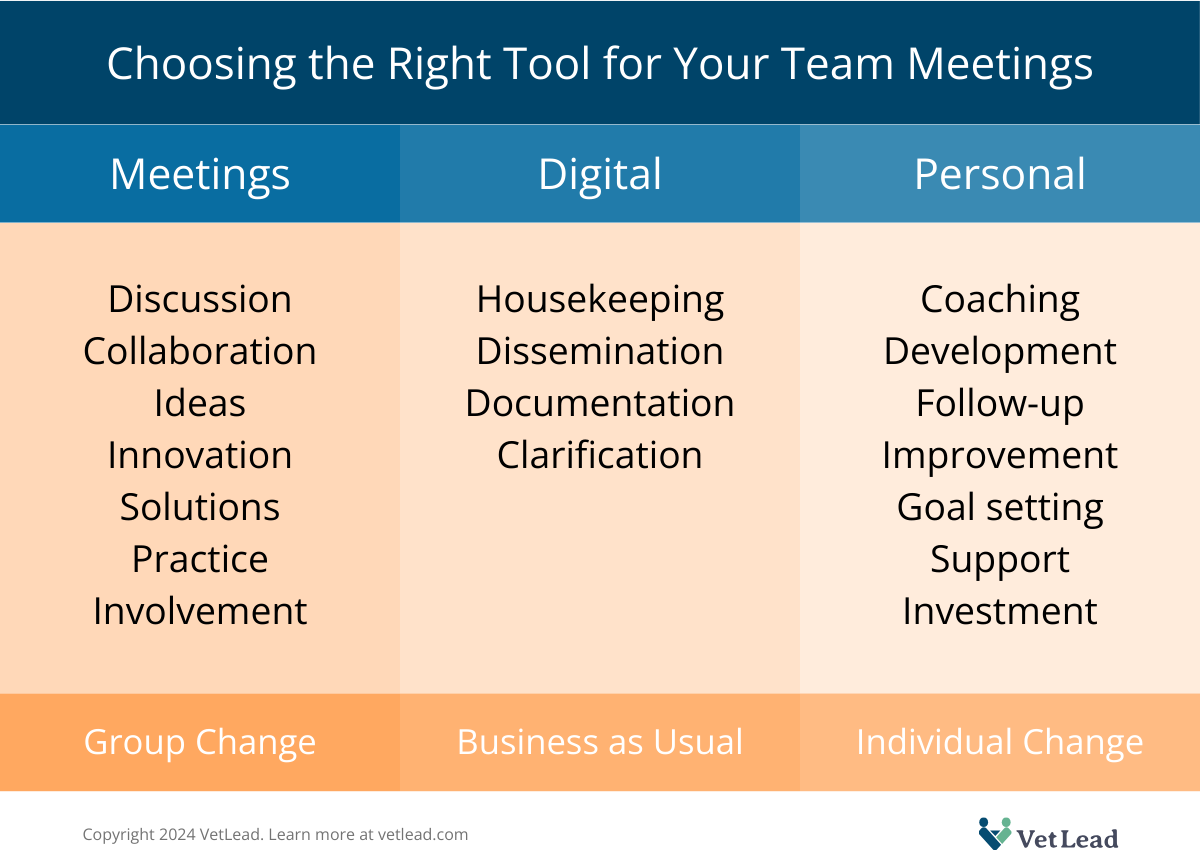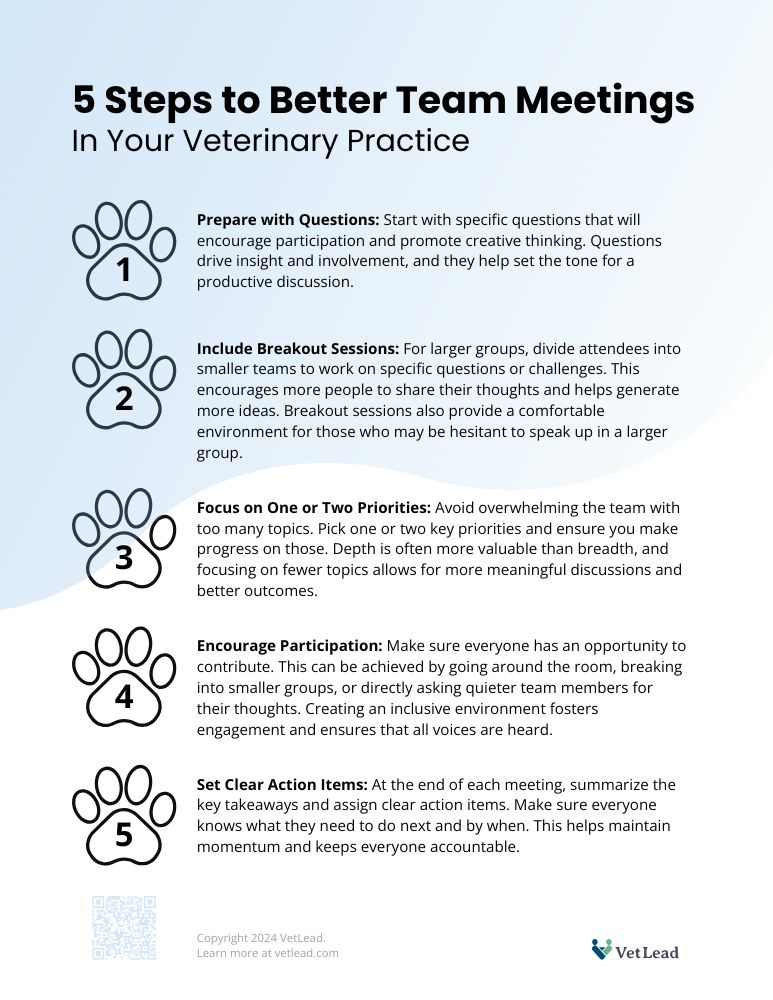Team meetings often have a bad reputation—many of us dread them, and for good reason. But they don't have to be that way. When done well, veterinary team meetings can become an incredible opportunity for collaboration and growth. To create meetings that move your practice forward, it's important to recognize what makes them valuable — and what doesn't. Let's explore some common pitfalls and discover how to turn your meetings into a powerful tool for positive change.
Why Meetings Fall Short
Too often, meetings fail to deliver the results we hope for. Here are some common reasons why meetings lose value:
They Focus on Updates or Housekeeping
Meetings filled with basic updates or housekeeping tasks often feel like a waste of time. These kinds of announcements can usually be sent in an email or covered in a quick huddle.
They Focus on Problems
When meetings are primarily about what went wrong or what's broken, they become something to endure rather than look forward to. Nobody enjoys attending a meeting to only hear about mistakes.
They Are Repetitive
Discussing the same issues over and over without seeing progress leads to frustration and disengagement. Meetings should be about moving forward, not getting stuck in a loop.
They Suffer from Poor Prioritization
Wasting time on low-priority topics means the important things don’t get the attention they deserve. If meetings lack a clear focus, they lose their effectiveness.
Choose the Right Tool for Communication
Meetings are just one tool for communication, and they’re not always the right one. Sometimes, other formats are more effective:

How to Make Your Meetings More Valuable
To transform meetings into a powerful source of insight and involvement, it's essential to focus on the following aspects:
Focus on Improvement
Meetings should be spaces for growth and positivity. Instead of dwelling on what went wrong, focus on solutions and opportunities for improvement. When meetings emphasize positive change, people feel more motivated and eager to participate. This approach fosters an environment where team members are empowered to contribute, leading to greater engagement and better outcomes for your practice.
Plan Ahead
Effective meetings start long before everyone gathers in the room. Planning ahead is key to ensuring meetings are organized and purposeful. Think about the questions you want to ask, the insights you wish to gain, and the outcomes you hope to achieve.
Creating a detailed agenda helps you stay focused and makes better use of everyone's time. Planning in advance also signals to your team that the meeting is worth their attention and will be structured in a way that respects their time.
Hold Consistent Meetings
Holding meetings on a regular basis is crucial for building momentum. Consistent meetings create a rhythm that keeps everyone informed and involved. They provide opportunities for updates, discussions, and collective problem-solving. This regularity also fosters accountability—team members know they’ll have a chance to contribute ideas and share updates.
Consistent meetings help ensure that important issues are addressed promptly and that the team remains aligned on priorities and goals.
The Veterinary Leadership Program
Get info on this exclusive program.
Learn how to:
- 1Build an accountable team
- 2Make change happen
- 3Improve performance
- 4Hire exceptional talent
Includes live coaching.
Investment will be $897 per person
Be Specific About Next Steps
The ultimate goal of any meeting is to prompt action. To do this, it's vital to end meetings with clearly defined next steps. Specify what actions need to be taken, who is responsible for each task, and the timeline for completion. This clarity prevents misunderstandings and ensures that everyone leaves the meeting with a shared understanding of what needs to happen next. Clear action items also help maintain momentum between meetings and create accountability within the team.
Support Larger Team Meetings with Smaller Sessions
In larger practices, it can be challenging to address everyone’s needs in a single meeting. To reinforce key points and maintain momentum, supplement team meetings with smaller group or one-on-one sessions. These smaller meetings provide a setting for more in-depth discussions, personalized support, and problem-solving tailored to specific roles or challenges.
By offering these opportunities, you can ensure that everyone stays aligned and has the support they need to contribute effectively to the team’s goals.
Steps to Better Team Meetings
Here are some actionable steps you can take to make your meetings more effective and enjoyable for everyone:

5 Steps to Better Team Meetings
Download this PDF Now
Share it with leaders and teams. No email address required.
- 1Prepare with Questions: Start with specific questions that will encourage participation and promote creative thinking. Questions drive insight and involvement, and they help set the tone for a productive discussion.
- 2Include Breakout Sessions: For larger groups, divide attendees into smaller teams to work on specific questions or challenges. This encourages more people to share their thoughts and helps generate more ideas. Breakout sessions also provide a comfortable environment for those who may be hesitant to speak up in a larger group.
- 3Focus on One or Two Priorities: Avoid overwhelming the team with too many topics. Pick one or two key priorities and ensure you make progress on those. Depth is often more valuable than breadth, and focusing on fewer topics allows for more meaningful discussions and better outcomes.
- 4Encourage Participation: Make sure everyone has an opportunity to contribute. This can be achieved by going around the room, breaking into smaller groups, or directly asking quieter team members for their thoughts. Creating an inclusive environment fosters engagement and ensures that all voices are heard.
- 5Set Clear Action Items: At the end of each meeting, summarize the key takeaways and assign clear action items. Make sure everyone knows what they need to do next and by when. This helps maintain momentum and keeps everyone accountable.
Make Meetings a Tool for Growth
Effective meetings aren't just about sharing information; they're about fostering growth, collaboration, and alignment. By turning meetings into opportunities for improvement and engagement, you can create a culture where your team feels empowered and excited to contribute. Set clear priorities, choose the right tools for the job, and ensure everyone leaves the meeting with a sense of purpose and a clear understanding of next steps.
Meetings in veterinary practices can be powerful moments of connection and progress—when done right. Take the time to rethink how you approach them, and watch as they transform from a dreaded task to a vehicle for change.
How would you describe team meetings in your practice? Share what works for you with your colleagues in the comments below.